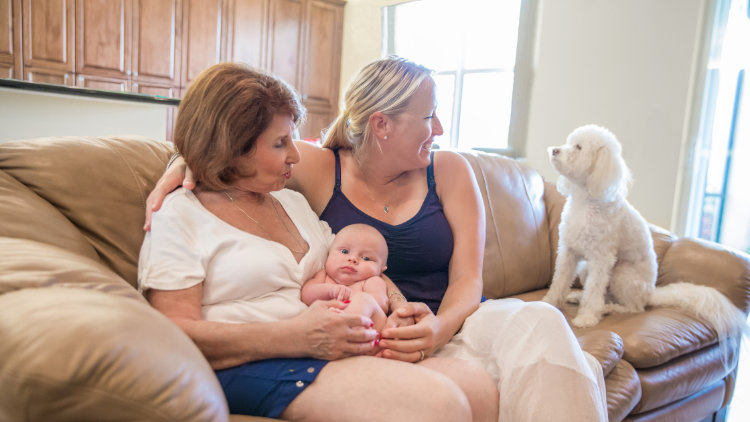Babies are cute—but they’re stressful to have around. That goes for humans and animals, so when you’re preparing to bring a new baby home, you’re going to need to be mindful of how the change might impact your furry friends.
Before You Bring Your Baby Home
If you have pets at home and are expecting to welcome a baby into your home, there’s some prep work to do before the birth—and the sooner you take care of these things, the easier life will be when the due date approaches.
Pet Healthcare to Keep Your Baby Safe
When you find out you’re pregnant, take your pets to the vet to be dewormed, receive up-to-date vaccinations, and get stool sample tests for parasites. Cats should also be tested for toxoplasmosis. Many pets carry parasites and diseases that seem harmless to them but can be serious dangers to pregnant women and infants.
And shortly before you plan to introduce your pet to your baby, trim your pet’s nails to avoid any potential scratching.
Train Pets Before Meeting a Baby
Long before your baby enters the world, you should start training your pets to ensure they’ll have good behavior around your newborn. Behavioral problems like jumping, growling, barking, or biting should all be addressed.
Usually, behavioral issues arise out of fear, anxiety, and discomfort. And they can always improve, no matter how old your dog is. But, it may take time if the problems are serious.
If you need to, consider hiring a reliable dog trainer or professional animal behavior consultant.
Avoid Last-Minute Changes
Bringing home a baby can be a shock to your pets, but even something as simple as rearranging the furniture can cause them unease. To ensure a smooth transition, unpack new furniture and make changes as early as possible to give pets more time to adjust to the changes.
This is also a good time to designate off-limit spaces that are only for your baby. That might be the entire nursery or just your baby’s crib. Train cats with a spray bottle and dogs with boundary training methods.
Play Pretend
This one will seem weird to you (and anyone who witnesses it) but coddling a toy doll around the house is a great strategy to prepare your pets for your behavioral changes. When you pretend to feed or put down a fake baby, your pets can adjust to how your attention will shift away from them after your real baby comes home. You can also play sounds of babies cooing or crying (if you can bear it).
Introducing Your New Baby to Your Pets
Doing all this prep work will help ensure a smooth meeting between your pets and your new child, but there’s still more you can do to keep everyone happy.
Say Hello First
Before you bring your baby into the house, greet your pet without your baby present. They will feel reassured seeing you and smelling you. And, if they’re prone to excitement when you return, this will give them time to calm down.
Meet on Neutral Ground
Then, when you bring your baby to meet your pet (or your pet to meet your baby), make sure the environment is neutral territory. For some families, that might be an area in the house or yard. Others may want to meet at the end of their driveway or on the sidewalk.
Maintain Parental Supervision
When they meet, both your pet and your baby should be secured (one by a lease or pet carrier, and the other in someone’s arms). When supervising this meeting, remain calm, reassure your pet, and avoid exciting them with energetic movements or voices.
Even after the first meeting, you should never leave your pets alone with your children, especially when they’re infants. You might think that your pet would never hurt your baby, but accidental suffocation can become a problem when animals cozy up to babies without supervision.
Reassure Your Pet with Quality Time Afterwards
After you introduce your pets and your baby, you might feel exhausted (you probably felt exhausted even before they met), but it’s important to give your pet some one-on-one quality time afterward.
After meeting a new baby, pets can experience anxiety and even jealousy. If you ignore or yell at your pet shortly after introducing them, they’ll associate their negative emotions with your baby. Instead, give them a positive experience to remember.
With a pet at home, it’s important to make sure that you don’t stop giving them attention after you come home with your baby. Resentful pets might overgroom, excessively lick, and have not-so-accidental accidents in the house.
